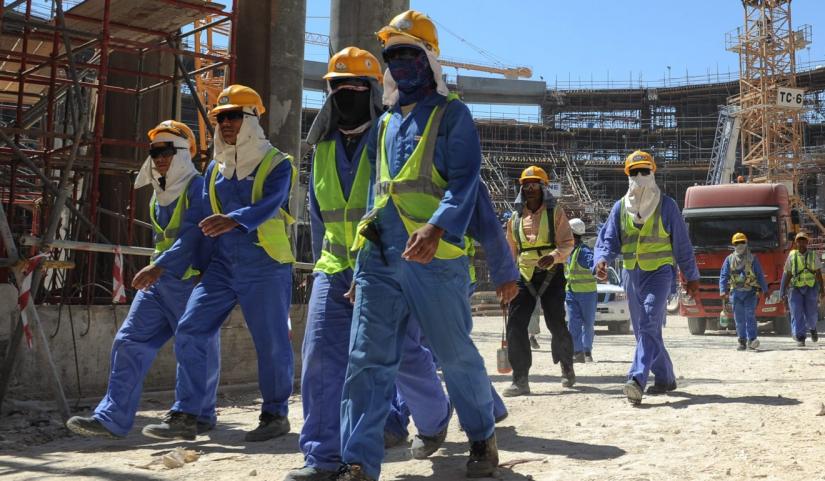 Due to the fluctuating price of oil, preference given to own citizens in employment and political turmoil, the middle-east labour market is constricting.
Due to the fluctuating price of oil, preference given to own citizens in employment and political turmoil, the middle-east labour market is constricting.
It’s believed that economic unrest is responsible for a shrinking job market.
Malaysia does not have any political volatility at the moment, but since excess tax is imposed on foreign workers, in order to provide jobs for locals, the job market in this south-east Asian nation is also narrowing.
Meanwhile, job markets in Saudi Arabia, UAE, Bahrain, Jordan, Kuwait, Lebanon, Oman, Qatar are experiencing a slump.
To bring down unemployment among her own citizens, Saudi Arabia has already declared that certain sectors will only be open to Saudi job seekers and has imposed a levy on employers of foreign workers.
Consequently, 7 lakh expatriate workers left the desert kingdom.
According to the decision of the Saudi government, all companies employing foreign workers will have to pay Saudi Riyal 300 per foreign worker while companies relying more on overseas workers will have to pay 400 Riyal per worker.
This step has been taken to create 12 lakh jobs for locals by 2020.
Due to the operation of unscrupulous middlemen and the involvement of a rising number of Bangladeshis in crime, UAE stopped taking workers from Bangladesh in 2012.
However, after a new deal signed this year, the UAE government has pledged to take workers in several gradual steps.
A 2013 survey carried out by UAE shows the foreign worker demographics: 95 per cent in Qatar, 94 per cent in UAE, 83 per cent in Kuwait, 71 per cent in Oman, 64 per cent in Bahrain, 49 per cent in Saudi Arabia.
In Malaysia, the government has made it mandatory for foreign worker employing companies to pay a levy of 10 thousand Ringgit per worker.
Malaysian minister for human resources said: “there will be a cooling period in re-hiring workers. Employers will have to wait six months if they want to hire the same worker for a second term.”
In this case, the employer has to pay an additional Ringgit 1800 with the application.
Deputy-minister for human resources, Mahfuz Umar, says: “Malaysian government is taking steps to reduce dependence on foreign workers and in this aim, they will train their own people and elevate their skills.”
We shall also start to make our workers skilled through training, he added.
Head of BRAC migration programme, Shariful Hassan, said: “it’s essential to add some form of discipline to the Malaysian labour market.”
In Malaysia, the number of workers, both legal and illegal, are similar in number, he informed.
“As a result, illegal workers are employed at a lower wage while legal ones are left out.”
Refugee and Migratory Movement Research Unit’s analyst, Dr. Jalaluddin Sikder, says: “Malaysia labour market will not constrict because her economy is dependent on manufacturing and agriculture.”
The problem in Saudi Arabia is that many refugees have come from other middle- eastern countries and they will have to be given work, he observed.
“Malaysia has a huge demand for workers which only Bangladesh can provide, they can also take Rohingyas since Mahthir Mohamamd has a soft corner for them.”
Recently, a team from Bangladesh went to Malaysia and a member of that group, additional secretary Dr. Ahmed Munirus Salehin, said: “the middle-east market may shrink but there’s no chance for the Malaysian market to become smaller.”
 Others
Others
30872 hour(s) 42 minute(s) ago ;
Morning 03:36 ; Thursday ; Apr 25, 2024
Middle-east job market shrinking, Malaysia still needs workers
Send
Saddif Ovee
Published : 07:30, Oct 22, 2018 | Updated : 07:30, Oct 22, 2018
Published : 07:30, Oct 22, 2018 | Updated : 07:30, Oct 22, 2018
0 ...0 ...
/tf/
Topics: Top StoriesExclusive
- KOICA donates medical supplies to BSMMU
- 5 more flights to take back British nationals to London
- Covid19: Rajarbagh, Mohammadpur worst affected
- Momen joins UN solidarity song over COVID-19 combat
- Covid-19: OIC to hold special meeting
- WFP begins food distribution in Cox’s Bazar
- WFP begins food distribution in Cox’s Bazar
- 290 return home to Australia
- Third charter flight for US citizens to return home
- Dhaka proposes to postpone D8 Summit
Unauthorized use of news, image, information, etc published by Bangla Tribune is punishable by copyright law. Appropriate legal steps will be taken by the management against any person or body that infringes those laws.
Bangla Tribune is one of the most revered online newspapers in Bangladesh, due to its reputation of neutral coverage and incisive analysis.
F R Tower, 8/C Panthapath, Shukrabad, Dhaka-1207 | Phone: 58151324; 58151326, Fax: 58151329 | Mob: 01730794527, 01730794528


